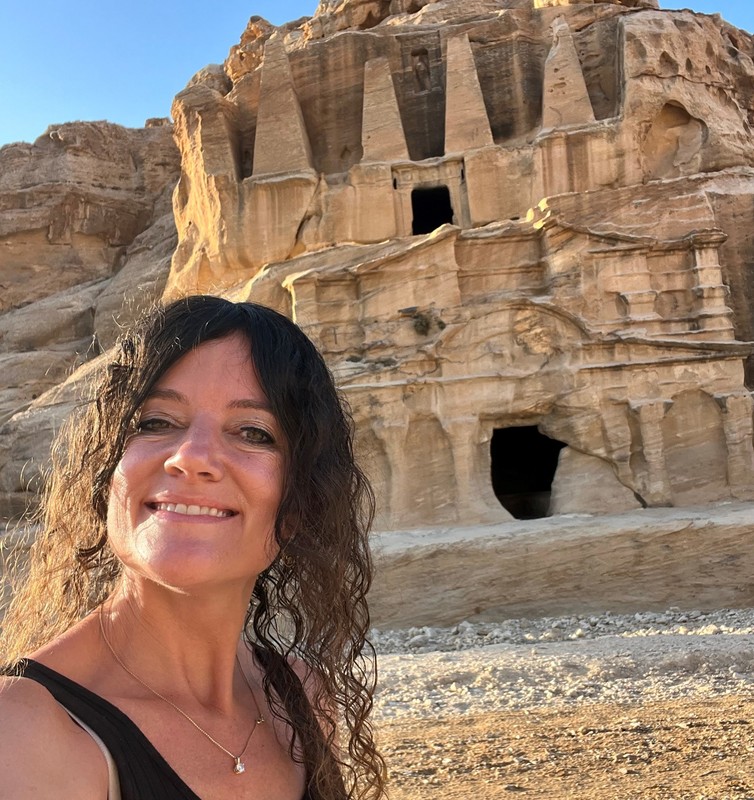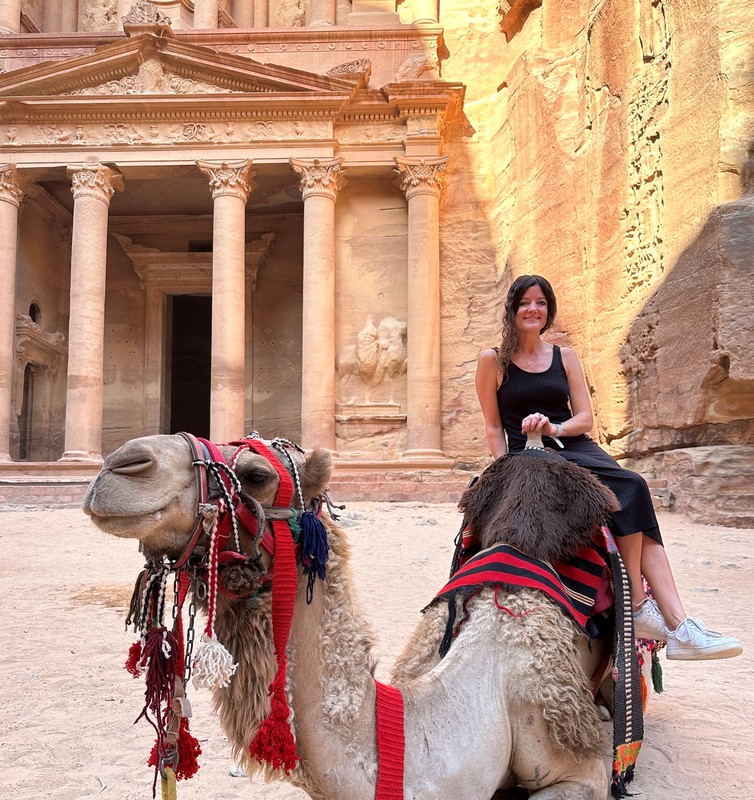Kerri Packwood is bringing lessons learned in Jordan back to her Don Tyson School of Innovation classroom.
The social studies teacher participated in the Fulbright-Hays Seminars Abroad Program from July 5 to Aug. 5, where she explored the migrations of peoples and empires that have shaped Jordan’s culture, Packwood said.
“I feel so grateful for this experience, for those who shared their stories with us and for the expanded network of connections in Jordan and with educators from around the U.S.,” she said. “My heart is full.”
Program participants included U.S. teachers, curriculum specialists, librarians, media resource specialists and educational administrators who support kindergarten through the eighth grade, according to the Fulbright-Hays Program description.
The program is funded by a Congressional appropriation to the U.S. Department of Education and awards grants and supports research and training efforts overseas that focus on non-Western foreign languages and area studies, according to the program.

Living History
Located in the Middle East, the Hashemite Kingdom of Jordan boasts one of the largest concentrations of archaeological sites in the world, according to the program. These sites are the physical remnants of peoples and civilizations who have migrated to or conquered the area now known as Jordan. Each of these peoples and civilizations has impacted the country’s historical, cultural and socioeconomic fabric, creating what is today a vibrant, multilayered Arab culture.
The histories of the region’s refugees and migrants were integral to her experience in Jordan, Packwood said.
“One common thread from these visits is the attitude that the presence of refugees in Jordan adds diversity to the fabric of Jordan’s identity and culture,” she said. “They are safe and welcomed here.”
Such conversations have value for the Don Tyson School of Innovation community, Packwood said.
“We’re working on projects to build into our curriculum that highlight best practices of Jordan and highlight culturally responsive teaching so that we can really be sensitive to the refugee and immigrant students that come into the United States,” she said.
Springdale Schools has about 12,450 students, 57% of enrolled students, with a multilingual background. Of that number, 7,438, 34%, are currently being served for English language development, according to Dr. Carrie Bradow, district English as a Second Language Programming and Services director. The remaining, 5,011, 23%, have a multilingual background, but are fully proficient in English and are not receiving English as a Second Language services through the district.
More than 15,000 Marshallese likewise live in Northwest Arkansas, according to the Marshallese Educational Initiative. Springdale boasts the second-largest national Marshallese population, with more than 12,000 Marshallese residents.
Hearing first-hand stories of migrant and refugee hardships was one of the most-challenging aspects of the seminar, Packwood said.
“Even with Jordan’s openness to diversity, they face challenges with accommodating the population,” she said. “Jordan is the second-poorest country in the world when it comes to water scarcity, and so the reality of what that looks like in a country that has opened its arms to the world breaks my heart.”

Lessons learned in Jordan complement district curriculum as well, Packwood said.
“In sixth-grade social studies, students are learning about the characteristics of civilizations in ancient history, from cultural and environmental characteristics, to their lasting contributions and achievements, to human settlement and migrations and beyond,” she said. “This particular region is relevant for my sixth-graders, because so many peoples that they will study have moved through the region overtime, evidenced by the archaeological artifacts and historic landmarks that remain in the area.”
Jordan has as many as 100,000 archaeological sites, and the ones she visited represented layers upon layers of various civilizations, eras, empires and cultures in one place, Packwood said.
The educator explored historical and archeological sites, nonprofit and relief organizations that serve refugees, as well as religious and holy sites in the Jordan areas of Amman, As-Salt, Jerash, Umm Qais, Aljoun, Petra, Wadi Rum, Al-Mafraq, Madaba, Aqaba, the Red Sea, the Dead Sea and the Jordan River, she said.
“One highlight was the day we had the chance to visit an organization serving the educational needs of primarily Syrian refugee children between the ages of 9-13,” Packwood said.
“We had the chance to participate in one of their English classes, which was an engaging vocabulary lesson with songs and games, and we even shared a meal together.”
A whirlwind trip to South of Jordan, was another seminar highlight, she said.
“We experienced epic sunsets and sunrises overlooking the vast desert of Wadi Rum, rode camels, hiked Petra by day and by night, sailed and snorkeled in the Red Sea and floated in the Dead Sea,” Packwood said. “It was truly amazing to experience.”
The opportunity to participate in such a seminar is a dream come true for a teacher, she said.
“It’s a history teacher’s dream to have the opportunity to tour archaeological landmarks and historic sites, but to explore them in an academic and cultural context with fellow educators was truly inspiring,” Packwood said. “My goal with this seminar has been to soak up as much as possible and improve my understanding and knowledge. I strive to be a lifelong-learner and I hope that my passion for learning inspires my students to love studying history and culture.”
Few things can compare with an educator’s real-world experiences concerning what students are learning in the classroom, said Amy Harrison, DTSOI principal.
“Anytime you can bring in real-world examples, the teaching and learning are enriched,” Harrison said. “Being able to teach students and share in your passions provides a positive impact on students’ learning experiences and the overall success of the school.”
Packwood’s commitment to the seminar hasn’t concluded now that she’s back in the classroom, she said.
“My responsibilities include developing a curriculum project that brings awareness to global diversity, particularly a project that highlights the diversity of Jordan’s culture and identity,” Packwood said. “The project will apply the layers of learning that have taken place and foster learning and empathy between cultures.”
The seminar was an enriching experience that she will work to transfer to DTSOI students in an impactful way, she said.
“I hope that my passion for sharing these stories with my students benefits their learning,” Packwood said. “Jordan is becoming more and more diverse, and its warmth and hospitality reminds me of Springdale and our schools here. I hope to share what I’ve learned about the diversity of Jordan’s modern culture in the classroom and beyond.”

